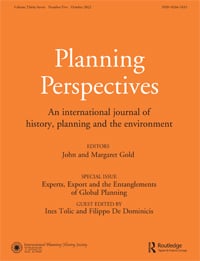Experts, export, and the entanglements of global planning
Filippo De Dominicis, Ines Tolic

Abstract
After the conferences in Bretton Woods (1944) and San Francisco (1945), and especially with the implementation of widespread technical assistance policies of the Point Four Program (1949), teams of experts composed primarily of architects, but also economists, sociologists and anthropologists, began to gravitate around supranational organizations such as the United Nations, the World Bank and the Ford and Rockefeller Foundations. A key centre of their interest was the new independent world that emerged from colonial rule and stepped onto the global stage in search of legitimacy and technical emancipation. The modernization of the so-called Third World, a flagship of international policy in the early 1960s, opened the door to a holistic and intrinsically global approach. Building on this foundation, this monographic issue of Planning Perspectives aims to investigate the role supranational organizations played in the architecture discourse and the rise of ‘global experts’ especially, but not exclusively, in the aftermath of the Second World War. Researchers draw on case studies such as development plans and housing schemes, but also events related to dissemination or training in order to frame the profile of the ‘global expert’, the role of supernational institutions and the legacy of their actions in the contemporary world.
Filippo De Dominicis & Ines Tolic (2022) Experts, export, and the entanglements of global planning, Planning Perspectives, 37:5, 871-887, DOI: 10.1080/02665433.2022.2116595



